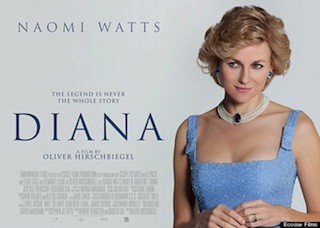People prefer gossip, conspiracy, or drama over truth
because we’re cynical. The recent release Diana
about the final years of Diana Spencer, Princess of Wales, is a controversial
attempt at rendering a portrait for the screen. The film is based on extensive research beginning with journalist/author
Kate Snell’s book Diana: Her Last
Love, interviews, news archives and Diana’s personal letters. From this
position, director Oliver Hirschbiegel, actors Naomi Watts and Naveen Andrews and screenwriter
Stephen Jeffreys create a lush and dystopian love story between a British royal
and a Pakistani heart surgeon.
In a haunting opening scene moments before the tragic
accident on August 31, 1997, the camera lingers behind and around Diana (a captivating
Naomi Watts) without capturing her face. As the film proceeds, temporarily eluding her death,
the camera trains on Diana’s countenance at a public event as if to reacquaint
the audience with a familiar face. Princess Diana, as some may recall, had an emotive
manner that endeared her to the public as a relatable royal. Furthermore, her
youth, style of dress, divorce and humanitarian work gave her unprecedented
celebrity status, especially in the press.
These early scenes in Diana advance
quickly with abrupt shifts in sound design to elicit feelings of dislocation or
disconnection. In this respect, we experience the icon, but soon experience
Diana’s life as a divorcee on a spiritual journey.
Like The Iron Lady, Diana is
caught in the wake of a public figure with an emotionally charged image.
Indeed, as much as Diana, Princess of Wales was a coveted figure, she was
largely unknown. The film shows that Diana was often the mastermind
behind her public statements and some well-placed tabloid stories meant to
counteract her troubles, promote a humanitarian mission and satiate popular
demand. Though The Iron Lady couldn’t manage Thatcher’s bulky contentious image, Diana juggles iconic image and reality
with greater skill by focusing on a specific time frame and many small intimate
accounts. In fact, personal narratives from friend Simone Simmons (Juliet
Stevenson) and spiritual advisor Oonagh Toffolo (Geraldine James) feature in
the film, providing insight into Diana — a complex, strategic, seductive
and deeply sensitive woman.
After
Oonagh’s husband, Joseph, falls ill, Diana meets Hasnat Khan, his doctor. According to an interview from Oonagh, Diana was
smitten from the start and began to pursue the doctor while finalizing her
divorce. These scenes are full of the schmaltzy lines. At one point, while getting acquainted, Hasnat responds to a
question about surgery and says “You don’t perform the operation,
the operation performs you.” There are many such lines in the film that
seem like hackneyed poetry; as in a later scene in bed with Hasnat quoting
Rumi. However, I wonder if these foibles serve a purpose. It seems Jeffreys was
grasping for poetry. In fact, the entire cast and crew were grasping for poetry. The cinematography of warm tones,
blues and greens all elicit romance. But one important point to make is how often do we see a love story
with a professional Pakistani man and royal British woman? And how receptive
would we be even if the lines were perfect?
The scene that made the greatest impression on me was with Hasnat’s
mother, Naheed (Usha Khan), whom Diana meets when she travels to Pakistan to meet his relatives. Khan’s mother is a stunning, educated woman who pointedly
holds Great Britain accountable for its colonial legacy in Pakistan. Naheed’s
first words to Diana express her political beliefs and leave Diana speechless. Yet Diana is able to shake this off and manages to acquaint herself with less critical
family members and soon is frolicking among the children like a long lost aunt. But the script gets in its own way again by fumbling for poetry — Aha! ‘The people’s princess!’
Fundamentally, Diana is
a flawed, melodramatic romance. Its greatest appeal is not in a
dystopian love story, but in Diana’s journey to find herself through
spirituality, love and profession. Although the love between Diana Spencer and
Hasnat Khan seemed genuine, it’s unfortunate that Diana’s life consistently
relates to the cliché of a princess finding her prince charming. Clearly there
is no such thing. Such is to say, the image
of Diana Princess of Wales as a woman searching for romantic love overshadows
the reality of a woman in search of herself. The film attempts to illustrate this
point without explicit mention, but may have done better under a woman’s
direction.
Like Hirschbiegel’s exceptional historical feature Downfall, about Hitler’s
last days, Diana demands suspension
of disbelief. The audience must believe in the life of a princess, star-crossed
romance, and the tyranny of the press. However, Diana, like the princess, is up against a cynical world and as dismal box office returns indicate, for most, suspension
of disbelief for an well known woman and an unfamiliar love story is too much to ask.






